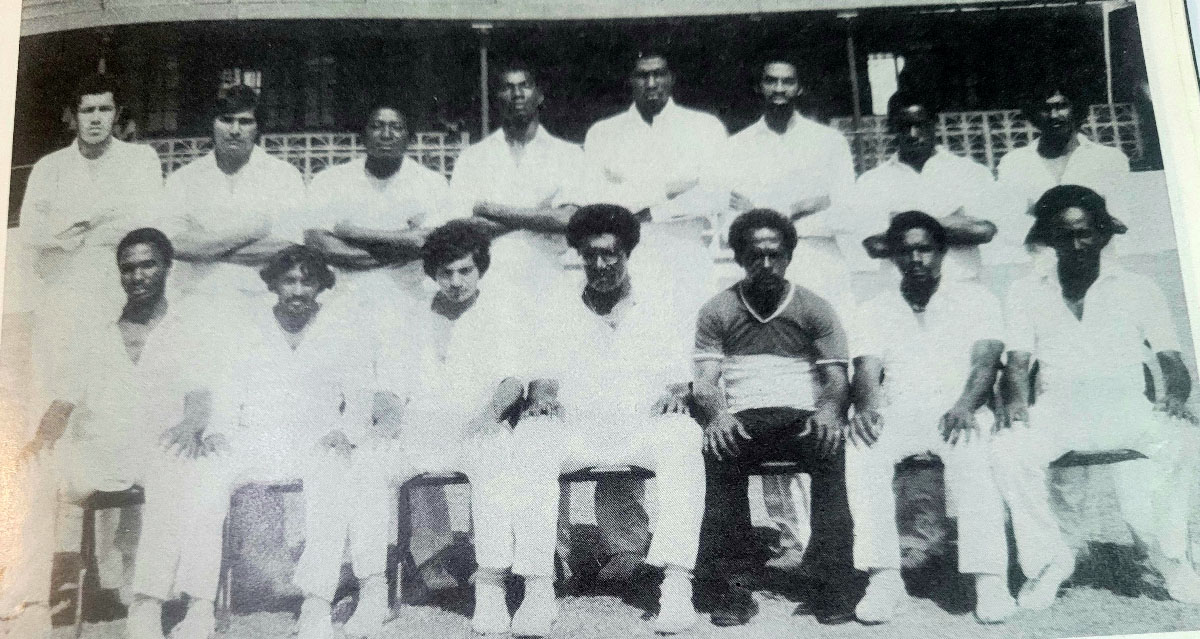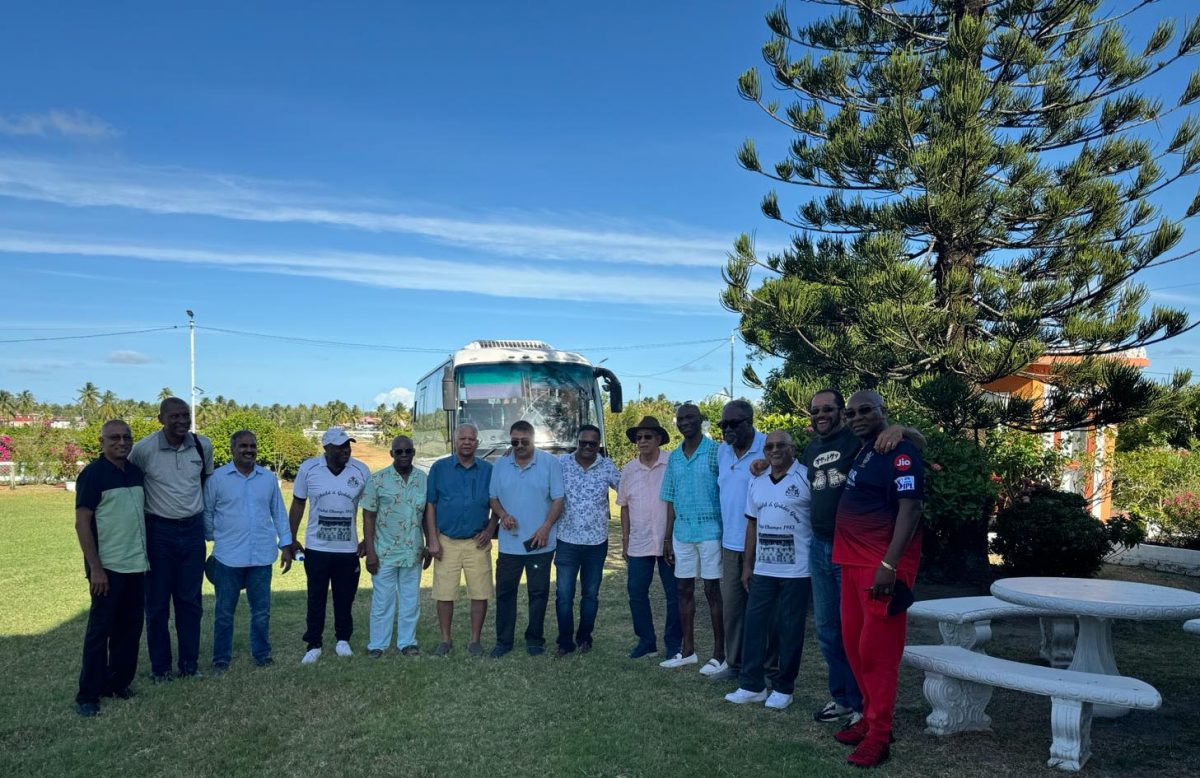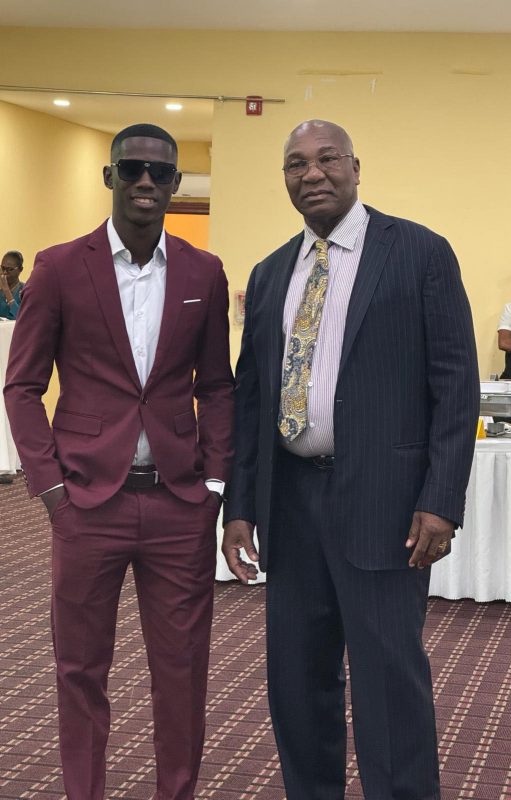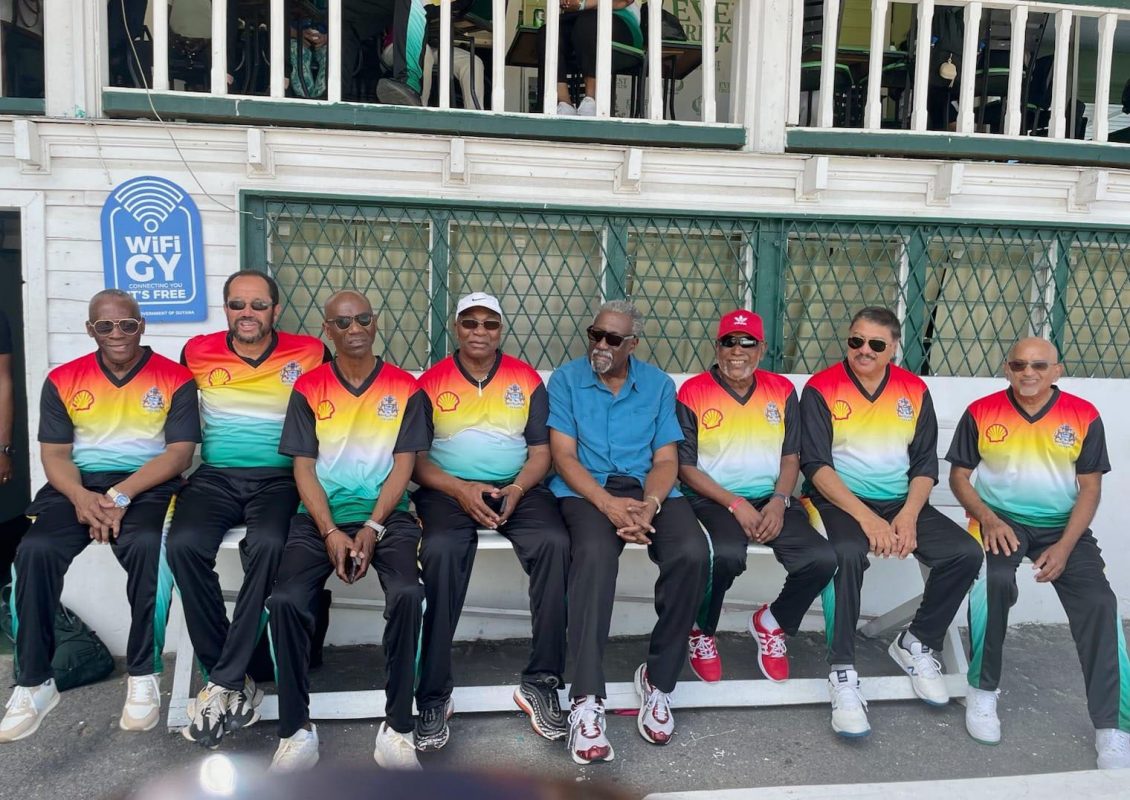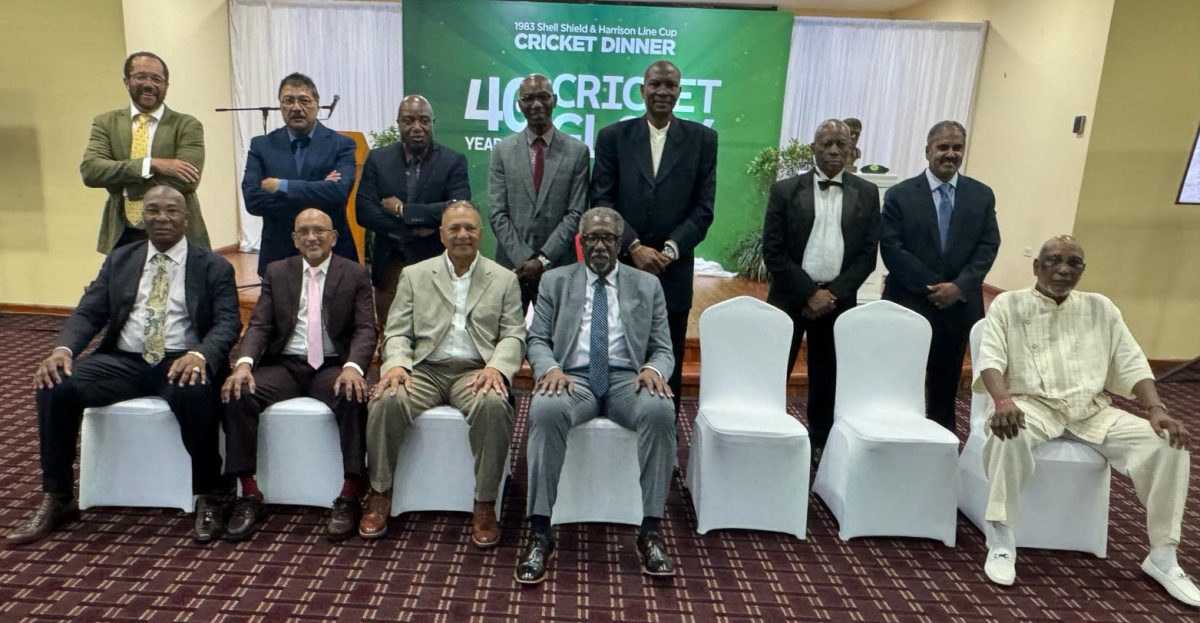In this week’s edition of In Search of West Indies Cricket, Roger Seymour chats with Leslaine (Les) Lambert about the recent reunion to celebrate Guyana’s double triumph during the 1983 West Indies season, looks at snippets of the season and the aftermath.
Here are excerpts from a telephone interview last Tuesday evening, 12th March, with Lambert, who now resides in Delaware, USA.
RS: “Where did the initial idea for the reunion spring from?”
LL: “Actually the idea was raised whilst chatting with Monte [Lynch], who lives in England, during the height of the Covid-19 pandemic, probably about three years ago. Of course, we had to wait until everything returned to normal before we could do anything. After doing some research I realised we were the first team in the Caribbean to do the double; win both the Shell Shield and the Geddes Grant/Harrison Line One Day [50 overs] Tournament in the same year.
When I went home last year for my mother’s hundredth birthday, I had lunch with Mark [Harper], Roger [Harper] and Clyde [Butts], and put forward the idea. They agreed with the proposal and suggested I speak to retired Major General Norman McLean, who was president of the Cricket Board back then, and is the person who can organise something of this nature. I met with him and he agreed to put it together. He gave me the responsibility of contacting all the players, getting their numbers and emails, and telling them of the reunion.”
RS: “How difficult was that task? And who was the hardest to get hold of?”
LL: “It wasn’t difficult at all. I’m retired now, I had the time. You know, as a team, we have always kept in touch. Several of us are in the New York/New Jersey area – actually, I used to live in New Jersey – Tyrone [Etwaroo], Whitee [William White], Derek [Kallicharran], Faoud [Bacchus], Py [Milton Pydanna], Ray [Joseph], Kamal [Singh]. We talk all the time, and get together often.
“If the Skipper Clive, don’t pick up, don’t worry, he will always return your call. Anyway, I saw him when he came to New York for Labour Day weekend, and of course, he was on board. Roger and Clyde were in Guyana. Unfortunately, we lost Clyde, who was assisting with organising this event. Well, Garfield [Charles] in New Zealand was the most difficult because the time difference is like 18 hours. When I was calling him he was sleeping and when he was calling me I was sleeping [laughter], but anyway, we eventually made contact and everything worked out.
Major General McLean got local sponsorship which covered the cost of all the local arrangements for the reunion, including accommodation.”
RS: “What was the confidence level of the team going into the [1983] Shell Shield Tournament?”
LL: “It was quite good. Actually a lot of things fell into place that year. The preparations and confidence building began in October, the year before, when a Caribbean XI visited Guyana for four matches. The West Indies did not have a winter tour that year and the Skipper came home after the County season [where he was playing for Lancashire] and he led us in that series. We did very well against that team which had several good players. The first match was at Albion, then two games at Bourda, and the last one was at Hampton Court, Essequibo.”
Lambert’s memory is perfect. The Caribbean Invitation XI Tour was sponsored by a group named Charity Promotions, with former Barbadian fast bowler Gregory Armstrong involved in organising the series. The Caribbean XI was led former West Indies Test off spinner Albert Padmore (2 Tests), and included fellow Barbadians – Sylvester Clarke (11), Collis King (9), Alvin Greenidge (6), Leslie Reifer, Gregory Armstrong, Emmerson Trotman, Franklyn Stephenson and Neil Phillips; Windward Islanders Winston Davis (15) and Ignatius Cadette; Kittian Luther Kelly and a young Jamaican fast bowler, Courtney Walsh. The Guyana squad led by Clive Lloyd included Andrew Lyght, Rabindranauth Seeram, Roy Fredericks, Faoud Bacchus, Tyrone Etwaroo, Monte Lynch, Kamal Singh, Roger Harper, Leslaine Lambert, Milton Pydanna, Ray Joseph, William White, Derek Kallicharran, Andrew Jackman, Lambert Blackman and Stephen Bamfield.
Series scores
7th October, at Albion, Berbice. Caribbean XI, 193 for seven, off 45 overs; A Greenidge, 71, L Reifer, 55. Guyana, 173 off 38.2 overs. Caribbean XI won by 20 runs. Rohan Kanhai, batting seventh was run out for 10.
9th October, at Bourda. Guyana, 189 for seven off 39 overs; M Lynch, 72*. Caribbean XI, 136 off 35 overs; A Greenidge, 43. Guyana won by 53 runs.
10th October, at Bourda. Guyana, 242 for six off 42 overs; S Bamfield, 55, W White, 50*. Caribbean XI, 204 for nine off 42 overs; C King, 68, E Trotman, 58. Guyana won by 38 runs.
12th October, at Hampton Court, Essequibo. Guyana, 221 for seven off 45 overs; A Lyght, 126. Caribbean XI, 207 off 44.1 overs; L Reifer, 76, A Greenidge, 70. Guyana won by 14 runs. Courtney Gonsalves and Jeff Jones of Essequibo were included in the Guyana XI.
LL: “As you might remember for a lot of years we hardly used to have proper trial matches. The rain used to play havoc with our preparation and we used to have to practice on the Cultural Centre tarmac. That year we had excellent weather, several good net sessions at Bourda and we were able to prepare properly. Also, Major General McLean had arranged for the one of the army physical instructors, Ami John, to work with us. We used to have training sessions in the army’s gymnasium at Camp Ayanganna. We were in great shape when we left for Dominica.
“I remember in the team talk before the first match, the Skipper telling us we could win it all if we played within ourselves. Remember we were a relatively young team. There was Skipper Clive and Bacchus, Test players, and then the rest of us didn’t have much experience. It was a real team effort. Everyone chipped in at some stage. Freddo was player-manager but he didn’t play in the early matches.”
Guyana’s Shell Shield record between 1976 and 1982 can only be described as woeful. After winning the Shell Shield in 1975 under Clive Lloyd, (In Search of West Indies Cricket, ‘Who won the 1975 Shell Shield? Ask Tanti Merle’, SN, 15 May, 2016), Guyana won only one match in the next seven seasons – defeating the Combined Islands by five runs at Bourda in 1978 – finished bottom of the standings four times, and in the penultimate position twice. The young Guyana team began the 1983 four-day competition with three away matches.
LL: “In the first game against the Windward Islands, we stumbled in the first innings, but Bacchus made a big hundred in the second innings, and on the last day Harper and Butts cleaned them up.”
Shell Shield: Guyana versus Windward Islands, January 21 – 24, Windsor Park, Roseau, Dominica. Scores: Guyana, 162; A Lyght, 56, W Davis six for 54 & 334, F Bacchus, 143. Windward Islands, 258; L Sebastien, 88, L John, 56, C Butts, five for 81 & 130, R Harper, five for 33. Guyana won by 108 runs. Guyana: 16 points, Windwards: 5 points. Man of the Match: F Bacchus.
At one stage in the first innings, the Windward Islands were in the commanding position of 137 for one, but failed to capitalise on their excellent start. Bacchus’ magnificent knock included one six and 11 fours and lasted for five hours and ten minutes. The Windwards, chasing 235 for victory, began the last day on 57 for two, and quickly succumbed to the guile of the off-spin duet, whose fourth day returns read: Harper 15 – 6 – 21 – 4 and Butts 13 – 6 – 20 – 2.
Geddes Grant/Harrison Line Trophy: Guyana versus Leeward Islands, January 26, Warner Park, St Kitts. Scores: Guyana, 240 for eight off 45 overs; F Bacchus, 84, M Lynch, 35. Leeward Islands, 191 for nine off 45 overs; L Kelly, 55, R Richardson, 45. Guyana won by 49 runs. Man of the Match: F Bacchus.
LL: “Andrew was in tremendous form against the Leewards. The batsmen from the Islands couldn’t handle Butts and Harper. I probably had only one spell in each innings, the spinners [Butts, Harper and Kallicharran] were causing lots of problems.”
Shell Shield: Guyana versus Leeward Islands, January 28 – 30 (31), Grove Park, Nevis. Scores: Guyana, 213; A Lyght, 94 & 318, A Lyght, 100, D Kallicharran, 69, F Bacchus, 56. Leeward Islands, 91; C Butts, five for 23 & 267, V Eddy, 58, L Kelly, 56, R Harper, five for 95. Guyana won by 173 runs. Guyana: 16 points, Leewards, 0 points. Man of the Match: A Lyght.
LL: “Then we went to Barbados. We didn’t have a good record in Barbados. There were always beating us. So, that match was very important to us.”
In the previous three Shell Shield encounters at the Kensington Oval, Guyana had experienced the bitter taste of defeat. In 1977, Barbados after gaining a first innings lead of 139, won a hard fought battle by three wickets. In 1979 and 1981, the famed Barbados pace attack led by Malcolm Marshall and Sylvester Clarke demolished the Guyana side within three days, by an innings and 40 runs, and by an innings and 260 runs, respectively. Guyana’s average total for the four innings was 128.5, while the highest individual score was 52, by Mark Harper, in the second innings of the 1981 match. Captain Lloyd had not played in any of the games.
Geddes Grant/Harrison Line Trophy: Guyana versus Barbados, February 2, Kensington Oval, Barbados. Scores: Guyana, 244 for eight off 42 overs; M Lynch, 129, F Bacchus, 66, M Marshall, five for 38. Barbados, 199 for nine off 42 overs; L Reifer, 52*, G Greenidge, 49, G Charles, four for 51. Guyana won by 45 runs and qualified for the final. Man of the Match: M Lynch.
After losing Lyght and Etwaroo with only nine on the board, Lynch and Bacchus launched a vicious assault on some loose Barbadian bowling, whilst adding 150 for the third wicket. In an interview in 2010, Lynch recalled, “It was like a battleground and very verbal. When Roger Harper came to the wicket, he said he looked at me and could have said anything, but nothing would have registered because I was so fired up.” So was Marshall, who struck body blows on Etwaroo, Bacchus and Lloyd that day. Lynch’s 129 was the then highest score in the history of the competition.
Shell Shield: Guyana versus Barbados, February 4 – 7, at Kensington Oval. Scores: Guyana, 230; A Lyght, 112, M Lynch, 47, G Linton, five for 35 & 420, C Lloyd, 104, M Lynch, 75, M Pydanna, 72*, D Kallicharran, 57, A Lyght, 53. Barbados, 403; T Payne, 107, D Haynes, 79, G Linton, 66 & 132 for four. Match drawn. Barbados, 8 points, Guyana, 4 points. Man of the Match: T Payne.
This third round fixture was a top-of-the-table clash with both teams having won their first two games, and the defending champs let slip an opportunity to take control of the tournament through a series of dropped catches. Losing the toss for the third successive game, Guyana were once again invited to bat first. Lyght continued his fine run of form with the second successive century for the season – he had also taken a hundred (103) off the Bajans in the previous season’s rain-affected Shell Shield match at Bourda – an innings that lasted over three hours and included two sixes and 13 fours.
Despite Lloyd’s aggressive century, the Barbados lead of 173 loomed large, after debutante Roddy Estwick took a hat-trick at the end of the third day, to leave Guyana only 121 ahead, with three wickets remaining. Pydanna and Kallicharran rode their luck of botched chances whilst adding 87 for the eighth wicket and occupying crucial time at the crease. Barbados was eventually left with the impossible task of scoring 248 in 40 minutes and the final session. The hard fought draw had broken the spell of defeats.
LL: “We returned to Guyana full of confidence. We then played Trinidad at Albion, my home ground, where I had my best returns at the first class level, seven for 59. Fredericks, coming out of retirement, and the Skipper both scored centuries as we easily won the game.”
Shell Shield: Guyana versus Trinidad & Tobago, February 10 – 13, at Albion. Scores: Trinidad & Tobago 243; A Logie, 117, L Lambert, seven for 59 & 159, A Logie, 62. Guyana, 395 for nine declared; C Lloyd, 136, R Fredericks, 103 & 9 for one. Guyana won by nine wickets. Guyana, 16 points, Trinidad & Tobago, 0 points. Man of the Match: L Lambert.
A Trinidad team bereft of their senior batsmen, Larry Gomes and Richard Gabriel, and reluctant to play over the carnival weekend, were brushed aside by a confident Guyana side. Lambert, getting a rare chance with the second new ball, grabbed five wickets for 18 runs, to add to the two he taken with the original new ball. The two stalwarts, Lloyd and Fredericks, added 163 for the fourth wicket in two hours and 20 minutes, as Guyana batted themselves into a formidable position. It was Fredericks’ first first class match in three years. Lambert’s two wickets in the second innings gave him match figures of 30.2 – 7 – 75 – 9.
Shell Shield: Guyana versus Jamaica, March 3 – 5 (6), at Bourda. Scores: Jamaica, 149; D Kallicharran, six for 60 & 267, O Peters, 89, M Neita, 60, C Butts, five for 54, D Kallicharran, three for 86. Guyana, 517 for eight declared; R Fredericks, 217, C Lloyd, 64, F Bacchus, 57, D Kallicharran, 50*. Guyana, 16 points, Jamaica, 0 points. Man of the Match: D Kallicharran.
Guyana secured their third lien on the Shell Shield within three days, as a dispirited Jamaican team became the only side to lose by an innings during the 1983 season, succumbing to Kallicharran’s mesmerising leg spin. Fredericks’ epic double century, his second in the Shell Shield, compiled over seven hours and 40 minutes, ensured that the home side only batted once. It would be his last first class innings.
Guyana finished with 68 points, followed by the surprising Windward Islands on 61 points and Barbados on 56 points.
Geddes Grant/Harrison Line Trophy Final: March 19th, at Bourda. Scores: Guyana, 211 for eight off 41 overs; D Kallicharran, 68*, K Singh, 44. Jamaica, 83 of 25 overs; G Charles, five for 18, R Harper, three for 13. Guyana won by 128 runs. Man of the Match: D Kallicharran.
Guyana were in dire straits at 69 for five, with Fredericks, Lyght, Lynch, Bacchus and Lloyd, back in the pavilion. It was then the turn of the younger generation to show their mettle, as Derek Kallicharran (Alvin’s younger brother) led the way with the bat, with excellent support from Kamal Singh, and Garfield Charles, the youngest member of the team, took the ball.
Aftermath
Lyght lived up to his nickname with a ‘Monster’ season with the bat, heading both Guyana’s aggregates and batting averages with 493 runs at an average of 61.62. Lloyd was second with a total of 412 at an average of 58.85.
Lambert topped the bowling averages with 20 wickets at an average cost of 17.90. Butts’ 25 wickets cost an average of 18.32, whilst Harper’s 24 wickets cost 20.50.
Lyght, Butts and Harper were selected for Shell Shield XI based on their performances.
Guyana’s double championship season, centred around a spin trio attack and one fast bowler (Lambert), put paid to the fallacy that Lloyd could only win with a pace quartet.
Five members of Guyana’s double winning side – Bacchus, Butts, Kallicharran, Lambert and Lyght – were selected for the West Indies ‘B’ Team Tour of Zimbabwe in October, 1983. Captain-elect Bacchus opted to go to South Africa, and was replaced by Shane Julien of the Windward Islands. Timur Mohamed, the Guyanese left-hander (who had lost his number three slot to Monte Lynch), the only player remaining from the previous Zimbabwe Tour two years earlier, was appointed captain. Lambert, unfortunately, was injured after the first match.
Roger Harper was selected for the 1983 West Indies Tour of India, and made his debut in the Fifth Test at Eden Gardens, Calcutta, December 10th, 1983.
Lynch, the Surrey County professional, who had migrated to England in 1971, had heeded Lloyd’s call to return home and compete for a place in the West Indies side. Disappointed at his omission for the side to India – following his performances in the Shell Shield and Geddes Grant/Harrison Line competitions with 1,558 runs in the 1983 English season, at an average of 53.72 – Lynch joined Bacchus on the tour of South Africa. In 1988, Lynch was selected for England, and played three ODIs, ironically, against the West Indies.
Fredericks died from cancer on 5th November, 2000.
Lyght never got the chance to don the Maroon cap, as Greenidge and Haynes, “were like a pair of great rocks that weren’t going to be moved”, according to Roger Harper in an interview with the Wisden Cricketer magazine. Lyght passed away on April 16th, 2001.
Butts died in a tragic car accident on December 8th, 2023.
The itinerary for the 1983 Double Champions Reunion was:
February 29th: Welcome Cocktail Reception at Castellani House
March 1st: Reunion Dinner at Ramada Princess Hotel
March 2nd: Trip to Hampton Court, Essequibo Coast
March 3rd: Clyde Butts T20 Memorial game at Everest Cricket Club
